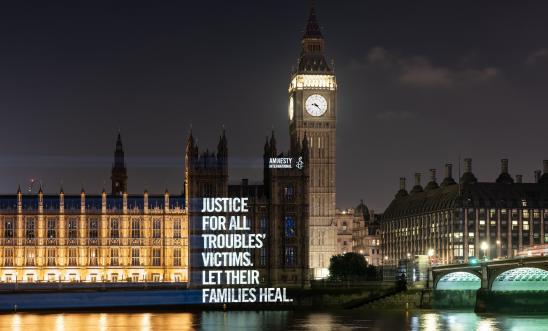
Press releases
Northern Ireland: Troubles' victims projected on Parliament as a final call to scrap 'universally opposed' bill

Projection marked a final call for the highly controversial bill to be scrapped ahead of it returning to Houses of Lords and Commons this week
UK Government is on cusp of passing bill which provides blueprint for human rights abusers all over the world
AV and photos of the projection can be found here
‘We are on the cusp of seeing… legislation passed which not only betrays victims but also provides a blueprint for human rights abusers all over the world’ - Grainne Teggart
Ahead of the highly controversial Northern Ireland Troubles Bill returning to Parliament this week (5th September in House of Lords and 6th September in House of Commons), Grainne Teggart, Amnesty International UK’s Northern Ireland Deputy Director, said:
“This is a hugely significant week for the legacy of the Northern Ireland conflict and victims’ rights as the UK Government recklessly pursues a bill that only it supports.
“We are on the cusp of seeing universally opposed legislation passed which not only betrays victims but also provides a blueprint for human rights abusers all over the world.
“The projection on Parliament shows the faces of some of the victims whose families are being bitterly let down by the Government. It is a timely and critical reminder that it is the victims, not perpetrators of serious crimes, who should be prioritised.
“Perpetuating the trauma of the Troubles and condemning victims to seemingly inevitable legal challenges to have their rights vindicated is shameful.
“Amnesty is making a final call to the UK Government to scrap the Bill – and if the Troubles Bill becomes law, the Irish Government must immediately challenge it by bringing an inter-state case to the European Court of Human Rights.”
Haunting images
This weekend Amnesty UK projected images of some of the Troubles victims who are yet to receive justice with a call for all victims to get the truth and justice they deserve.
These include Majella O’Hare who was shot dead by a British soldier in County Armagh when she was just 12 years old; Tom Oliver, a 43-year-old farmer who was tortured and murdered by the IRA; and the three Reavey Brothers - aged between 17 and 24 - who were killed by the Glenanne gang.
Majella’s brother Michael O’Hare said:
“I want Parliament and everyone to see my sister and pay attention to the many people being denied truth and justice. Lasting peace and reconciliation can only come when victims are prioritised and there is an agreed way forward.
“Majella’s life mattered and accountability for her killing and the many other crimes committed during the conflict also matters. Shame on the Government ignoring victims and the many others who reject this bill. This is a final call to them: do not let us down - drop the Troubles Bill.”
Troubles Bill: Deeply unpopular and damaging
This week the NI Troubles (Legacy and Reconciliation) Bill returns to Parliament.
The bill has already been overwhelmingly rejected by victims and victims’ groups as well as Amnesty and other human rights organisations, Northern Ireland political parties and the Irish Government. It has also prompted serious and repeated concerns from the US Congress, the UN High Commissioner on Human Rights, UN Special Rapporteurs, the Council of Europe Commissioner on Human Rights and the Committee of Ministers.
In June, Amnesty UK commissioned Savanta to conduct a poll across England, Scotland and Wales in response to the significant opposition to the bill in Northern Ireland. The poll showed opposition to the Bill extends across all parts of the UK.
Polling results revealed that more than half (53%) of UK adults – and six in ten (58%) Tory voters - said that those accused of killings in relation to The Troubles, should not be able to receive immunity from prosecution in exchange for providing information about the crimes.
Nine in ten (87%) UK adults also said that people should still be prosecuted for serious crimes, such as murder, even if they were committed decades ago.